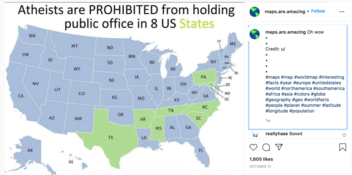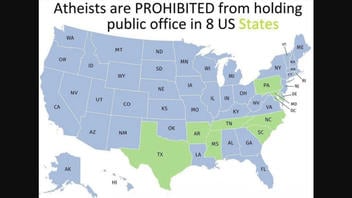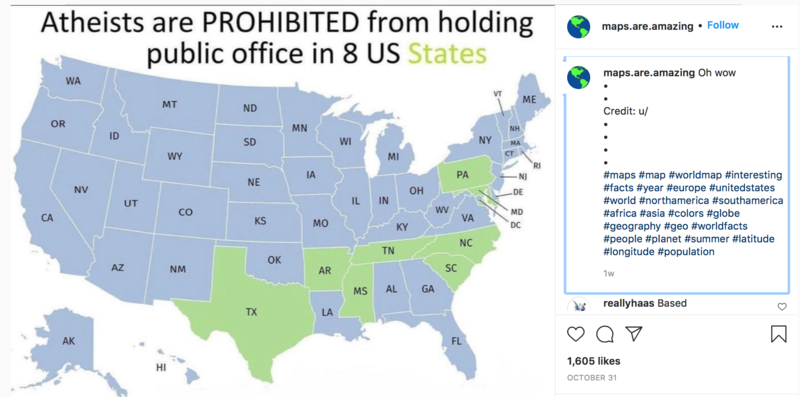


Are atheists "prohibited from holding office in 8 U.S. States"? No, that's not true: This claim is missing context. While clauses barring atheists from office remain in those states' constitutions, they cannot be enforced.
According to a spokesperson for the Freedom From Religion Foundation, a 1961 U.S. Supreme Court case ruling "makes all the state bans on atheists holding office unconstitutional and unenforceable." A University at Buffalo School of Law professor also told Lead Stories that such a ban would violate the U.S. Constitution's First Amendment because "freedom of religion under that provision includes the freedom to have no religion."
The claim appeared in an Instagram post (archived here) published on October 31, 2021. The image included in the post, beside a caption that opened "Oh wow," featured a U.S. map with eight states highlighted, which read:
Atheists are PROHIBITED from holding public office in 8 US [highlighted green] States
This is how the post appeared on November 9, 2021:
Lead Stories reached out to Rebecca Markert, legal director of the Freedom From Religion Foundation. In an email response on November 9, 2021, she cited this Religious Tests for Public Office page on her organization's website and said:
There are 8 states that have language in their constitutions that ban atheists from holding public office. These bans are null and void because of a 1961 decision from the U.S. Supreme Court, Torcaso v. Watkins. In that case, Torcaso was refused a commission to be a notary public because he refused to declare a belief in God. He sued over this provision of the state constitution and won (unanimously) in the U.S. Supreme Court. This decision makes all the state bans on atheists holding office unconstitutional and unenforceable. There have been some recent instances where communities have tried to invoke these bans. In South Carolina, for example, Herb Silverman, had to sue in the 1990s to be a notary public. In 2009, Cecil Bothwell ran for city council and community members threatened to invoke North Carolina's constitutional language to bar him from taking office. They backed off eventually. It is obvious that denying him his seat would be subject to a legal challenge, and they would lose. Still the language is on the books, and the only way to get them off the books is by having the states (either through the legislature or through amendments) remove the language, or having someone sue over them after being denied public office.
James A. Gardner, research professor of political science at the University at Buffalo School of Law, agreed in a November 9, 2021, email to Lead Stories:
I am unaware of whether or how many state constitutions contain a religious qualification clause, but it is certainly clear that no such restriction could be enforced. To do so would violate religious freedom under the First Amendment of the U.S. Constitution. Freedom of religion under that provision includes the freedom to have no religion.
The state constitutions of Arkansas, Maryland, Mississippi, North Carolina, Pennsylvania, South Carolina, Tennessee, and Texas still include language banning atheists from holding office, according to The Washington Post. A July 8, 2014, Washington Post article says Pennsylvania slightly differs as "believers cannot be disqualified from holding office for his or her religious sentiments, but that is not extended to atheists." The article also pointed out that the bans have not been enforced since the 1961 Supreme Court ruling.
Article VI of the U.S. Constitution states:
The Senators and Representatives before mentioned, and the Members of the several State Legislatures, and all executive and judicial Officers, both of the United States and of the several States, shall be bound by Oath or Affirmation, to support this Constitution; but no religious Test shall ever be required as a Qualification to any Office or public Trust under the United States.


















